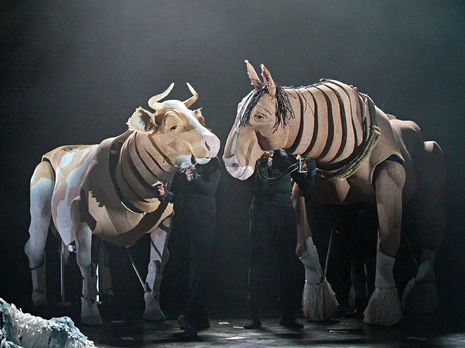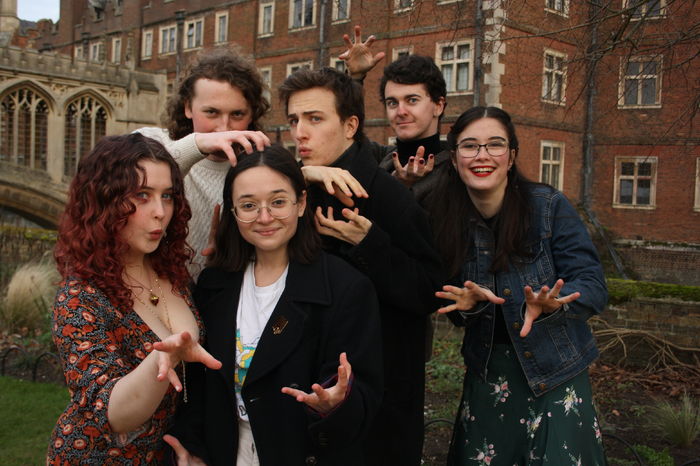Animal Farm at the Cambridge Arts Theatre is “simply stunning”
Editor Lewis Andrews reviews a new adaptation of the classic novella

“All animals are equal. . .but some animals are more equal than others.”
The line is searing into my memory. George Orwell’s Animal Farm is well-known across the globe, and it is one of those works read by all age groups. I, for one, had to read it during my GCSEs, and my Nan told me she had studied it for her school class too. So, how does one approach a text with so wide a readership, one attached to a whole history of interpretations and associations? The answer – like this. Animal Farm at the Cambridge Arts Theatre translates Orwell’s novella to the stage with grace and poignancy.
“The play dances on the line between humour and horror”
Before I had even sat down, a farmer upon the stage carried carcasses from right to left – a kind of morbid loading screen – which immediately invested me in the complex emotional dilemma. Inventive details like this are littered throughout: a cat comically licks its paws in the background to create tonal dissonance in a dramatic scene, an announcement board coldly relays the death toll as the play moves towards its violent conclusion. Multi-award winning director Robert Icke, who has successfully adapted Orwell before with his version of 1984, gives the text a fresh spark. Orwell’s literary power is captured and illuminated by Icke’s genius. The play dances on the line between humour and horror, where one feels that the burial of Harold the pigeon is both consciously a satirical allegory and a genuine moment of tragedy.
“The arrival of Boxer, the immense cart horse, was awe-inspiring”
‘Orwellian’ is a label lazily attributed to lots of things on social media, but Icke’s adaptation is distant from the modern-day noise associated with the author’s name. His approach is a work of palate-cleansing beauty. The focus is on the minutiae of a puppet’s movement – how to mimic an animal’s breath, how a chicken could express indignation at its superiors through its jumping flutters. But the play does not leave behind Orwell’s political aims. It lets the original text speak for itself, bringing the story vividly to life, and letting the audience draw their own comparisons to modern-day governmental hypocrisy. It is an allegory that transcends its relationship to the Russian Revolution.
The movement sequences are simply stunning, creating a sense of flow and maintaining the tension between scenes. Such was the choreography that, somehow, the ability for a goose to overthrow its human master seemed like a very real possibility, and something to be well pleased about when it was hilariously paired with an operatic soundtrack. Without giving too much away, the arrival of Boxer, the immense cart horse, was awe-inspiring (not least because his legs are taller than I am). Given that puppet designer/puppet director Toby Olié’s CV has previously worked on War Horse, Don Quixote and A Monster Calls to name but a few, his imaginative work with the puppets was no surprise. The animals are so compelling, that I occasionally wished the scenes would go at a slower pace so that we had more time to appreciate them.
I have seen many a play that uses puppets, but I’ve never seen them used to portray every main character. If this is the result, I hope to see it all the more, given the playfulness and creative freedom that the puppets offer up. The control that the puppeteers and actors had over their animals was masterful. Indeed, the Stalin-esque tyrant Napoleon was genuinely terrifying. Sound designer Tom Gibbons heightened the tension and drama of each scene with musical motifs that lingered in my head long after I had left the theatre. Ultimately, I think art like this helps us to reflect upon unimaginable exploitation and abuse. It sometimes takes animal puppets to bring home horrific historical realities.
Animal Farm is playing at the Cambridge Arts Theatre from Tuesday 8th until Saturday 12th of February 2022.
 News / Hundreds of Cambridge academics demand vote on fate of vet course20 February 2026
News / Hundreds of Cambridge academics demand vote on fate of vet course20 February 2026 News / University Council rescinds University Centre membership20 February 2026
News / University Council rescinds University Centre membership20 February 2026 News / Judge Business School advisor resigns over Epstein and Andrew links18 February 2026
News / Judge Business School advisor resigns over Epstein and Andrew links18 February 2026 News / Petition demands University reverse decision on vegan menu20 February 2026
News / Petition demands University reverse decision on vegan menu20 February 2026 News / Caius students fail to pass Pride flag proposal20 February 2026
News / Caius students fail to pass Pride flag proposal20 February 2026











